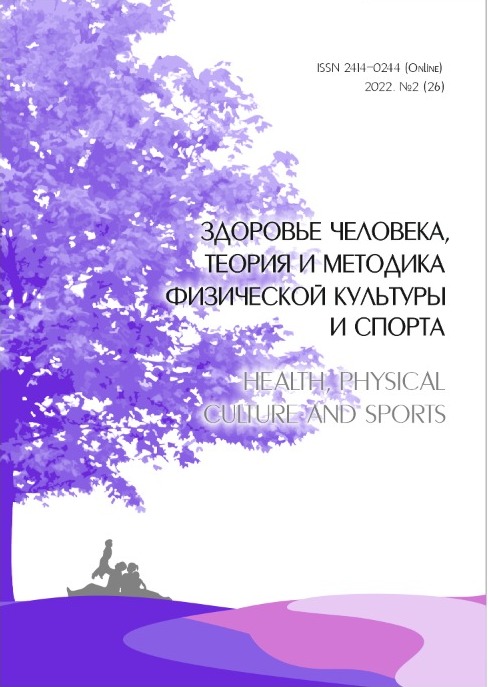FORMATION OF PLAYING ABILITIES IN AUTISTIC CHILDREN ENGAGED IN BOARD SPORTS GAMES
Abstract
The article presents studies of game teaching methods for correction of motor disorders in children with autism spectrum disorder undergoing rehabilitation in a medical and social center. It is shown in the study that the inclusion of board sports games in complex rehabilitation in children from the experimental group during 6 months significantly improved the indicators of basic gaming skills, individual and team playing practice, in comparison with children from the control group engaged only in developing, entertaining games. A differential approach and dosed physical activity during individual and group classes with such games as matryoshka, shuffleboard, culbuto, jaccolo, elastic and others contributed to an increase in individual resources of social and physical activity, as well as improved communication limitations and psycho-emotional state.
Downloads
References
Башаева Т. В. Развитие восприятия у детей. Форма, цвет, звук: популярное пособие для родителей и педагогов. Ярославль : Академия развития, 1998. 240 c.
Бейкер Б. Л., Брайтман А. Дж. Путь к независимости: обучение детей с особенностями развития бытовым навыкам. М. : Теревинф, 2000. 435 c.
Бралитис Г., Кохан С. Т., Середкин А. К. Популяризация и развитие настольных спортивных игр : практическое пособие / под ред. С. Т. Кохана. Чита, ЗабГУ, 2021. 104 c.
Гращенкова Н. С., Либлинг М. М. Развитие способности к общению у дошкольников с расстройствами аутистического спектра в групповых коммуникативных играх «лицом к лицу» // Клиническая и специальная психология. 2021. Т. 10, № 1. С. 15–35. doi:10.17759/cpse.2021100102
Карвасарская И. Б. Комплексная коррекция расстройств аутистического спектра // Под одной крышей. Опыт работы с аутичными детьми в Санкт-Петербурге. 20 лет. СПб., 2011. C. 42–50.
Лопухина А. С., Мелентьева Н. Н., Кустова И. А., Авдонина Л. Г. Значение адаптивной физической культуры как составляющей социальной инклюзии людей с ограниченными возможностями здоровья // Педагогический журнал. 2020. Т. 10, № 1А. С. 236–247. doi: 10.34670/AR.2020.1.46.128
Никольская О. С. Проблемы обучения аутичных детей // Дефектология : научно-методический журнал. 1995. № 2. С. 8–18.
Плаксунова Э. В. Характеристика нарушений двигательной сферы у детей с аутизмом // Аутизм и нарушения развития. 2008. Т. 6, № 2. С. 50–62.
Рудик О. С. Коррекционная работа с аутичным ребенком: кн. для педагогов: метод. пособие. М. : Гуманитарный изд. центр ВЛАДОС, 2015. 189 с.
Хаустов А. В. Исследование коммуникативных навыков у детей с синдромом раннего детского аутизма // Дефектология. 2004. № 4. С. 69–74.
Янушко Е. А. Игры с аутичным ребенком. Установление контакта, способы взаимодействия, развития речи, психотерапия. М. : Теревинф, 2004. 136 с.
Kokhan S., Romanova E., Nadeina L. et al. Problems of spatial orientation and mobility of students with visual impairments. Revista Inclusiones. 2020;7 (4):440–462.
Kokhan S. T., Romanova E. V., Skaliy A. V. et al. Adaptation Problems of Teachers and Students With Disabilities in the University Pedagogical Process in Russia. Palaestra, 2021;35 (2).
Liebling M. M. The role of play in correctional work in autism spectrum disorders. Almanac of the Institute of Correctional Pedagogy, 2017;2 (28):67–75.
Matyazh A. A. Features of the development of play activity in preschool children with early childhood autism. Omsk psychiatric journal, 2019;2 (20):26–29.
Must A., Phillips S. M., Curtin C. et al. Comparison of sedentary behaviors between children with autism spectrum disorders and typically developing children. Autism: the international journal of research and practice, 2014;18 (4):376–84. doi:10.1177/1362361313479039
Plyaskina N., Kokhan S. T., Romanova E. V. et al. Рsychological support for parents raising children with Autism Spectrum Disorder (ASD). Revista Inclusiones, 2020;7 (4):227–243.
Rogers S. J., Estes A., Lord C. et al. A multisite randomized controlled two-phase trial of the early start denver model compared to treatment as usual. Journal of the American Academy of Child & Adolescent Psychiatry, 2019;58 (9):853–865. doi: 10.1016/j.jaac.2019.01.004
Sorensen C., Zarrett N. Benefits of Physical Activity for Adolescents with Autism Spectrum Disorders: A Comprehensive Review. Review Journal of Autism and Developmental Disorders, 2014;1 (4):344–53.
Srinivasan S. M., Pescatello L. S., Bhat A. N. Current perspectives on physical activity and exercise recommendations for children and adolescents with autism spectrum disorders. Physical therapy, 2014;94 (6):875–89. doi:10.2522/ptj.20130157
Yu C. C. W., Wong S. W. L., Lo F. S. F., So R. C. H., Chan D. F. Y. Study protocol: a randomized controlled trial study on the effect of a game-based exercise training program on promoting physical fitness and mental health in children with autism spectrum disorder. BMC Psychiatry, 2018;18 (1):56. doi: 10.1186/ s12888–018–1635–9
Copyright (c) 2022 Health, physical culture and sports

This work is licensed under a Creative Commons Attribution-NonCommercial 4.0 International License.
An author should not normally publish manuscripts describing essentially the same research in multiple journals or publication venues. Such redundant publication is generally considered to constitute unethical publishing behavior, and if discovered may result in a manuscript under consideration being rejected, or a published article being retracted.
Authors of manuscripts reporting on original research should present an accurate account of the work performed, accompanied by an objective discussion of its significance. Underlying data should be represented accurately in the manuscript. The manuscript should contain sufficient detail and references to permit others to replicate the work. The fabrication of results and the making of fraudulent or knowingly inaccurate statements constitute unethical behavior and may be cause for rejection or retraction of a manuscript or published article.





